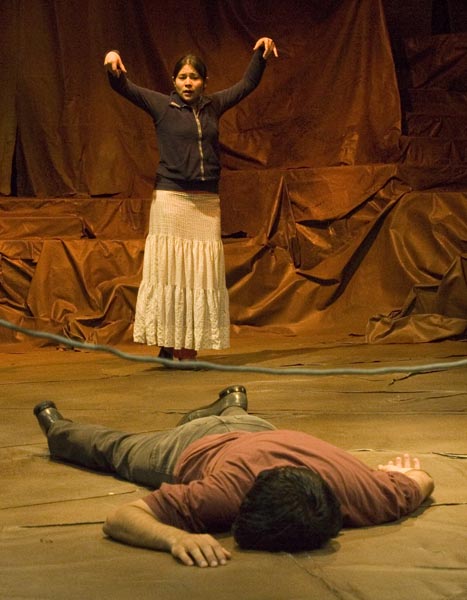Bringing out life, culture in Lorca

:
May 6, 2008
He was rebellious, different and then shunned.
“He is considered to be one of the best poets and dramatists in Spanish history,” said Manuel Pickett, director of Sac State’s production of “Lorca in a Green Dress.” “The play takes his poetic writings and working themes and moves and incorporates them into the play.”
The play centers around a Spanish poet and playwright named Frederico Garcia Lorca, who was killed at the age of 38 during the Spanish Civil War because of the ideas that he wrote about. He went by Lorca because that was the name he preferred to go by, as said in the Encyclopedia of World Biography.
The play “Lorca in a Green Dress” will be performed at Sacramento State in the first week of May, and it is an opportunity for students and the surrounding community to learn about Spanish art and history.
Pickett said that the play takes place after his death, in his own purgatory, where Lorca is helped to accept that he has died.
“The Spanish nationalists killed him and buried him in an unmarked grave,” Pickett said. “The play takes place in limbo and purgatory, because we don’t know where he is.”
There are several characters in the play who help Lorca accept that he is dead, which is a big task, because throughout the play Lorca needs a lot of convincing to realize that he is indeed dead.
“He gets killed three times in the play to help him realize that he is dead and helps him see that he was killed,” Pickett said.
Each character in the play represents a different aspect of Lorca’s personality, and they all guide him on his journey of accepting his death.
One of the characters is Lorca as a woman, who is played by Amanda Morish.
“I represent the side of Lorca that is the feminine side,” Morish said. “She connects with him on a different level than some of the other characters, and women have always understood him better.”
Morish also said that her character represents the women in his plays.
Green Dress, another character in the play, also represents the feminine side of Lorca.
Viewers of the play will see White Suit, who plays Lorca’s political side. There is also a flamenco dancer who follows Lorca around during the play and supports him during his journey in accepting his death.
“The play is very sensual because it has a very dramatic flamenco underpinning,” Pickett said.
Playgoers will also see a more innocent side of Lorca.
“Lorca in bicycle pants represents him as a little boy, and his hopes and dreams,” Pickett said.
Pickett also said that the play should help people realize what a great poet Lorca was, and to also help viewers see the world through the eyes of the poet.
“It is a tragic piece, but only in the fact that he is dead,” Pickett explained.
He said that the circumstances surrounding Lorca’s death were political, because Lorca was a leftist writer who didn’t call himself a Communist, but wrote plays about the working class in Spain.
“His work did mirror that of those people who were involved in the Communist working class,” Pickett said. “Communism focuses on the working class, and hung out with a lot of people who were from the left.”
He also said Lorca wrote countless poetry, was into surrealism and connected with surrealist painter Salvador Dali.
Lorca’s association with the left and working class is a big part of why he was killed during the Spanish Civil War, because Franco was threatened by those who supported communism and the working class.
Since Lorca hung out with those from the left and wrote about past history and the working class, he was pretty much a marked man.
Many other Spanish writers who also wrote about the past history were killed and tortured as well.
“These writers were working with the fact that they may get killed,” Pickett said.
Lorca’s work was banned in Spain until 1975, after General Franco’s death.
Playgoers will gain an appreciation of the Spanish writers in the past who made an effort to communicate with the working class. The play also gives a picture of what was happening around the time of Lorca’s death and why he and many other artists wrote what they did.
“People have heard of Lorca, but they don’t understand who he was,” Pickett said. “This play will help viewers understand this portion of Spanish history and the importance of Lorca’s works.”
He said there is an advantage to the lack of stage direction, because the director can direct the play however he or she sees fit.
“It is a very complicated play,” Pickett added. “A lot of poetry is used as dialogue and there aren’t any stage directions.”
There are also multiple layers to the play and Pickett suggested that the play could be seen twice because there are things that could be missed the first time around.
Morish said she thinks it is important that this play is being performed at Sac State because she feels it is important to portray Spanish heritage in the theater.
“I’m of Latina heritage,” Morish said. “It is important to do things that connect with my heritage.”
Stephanie Dumm can be reached at [email protected]




























































































































